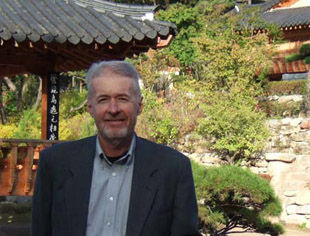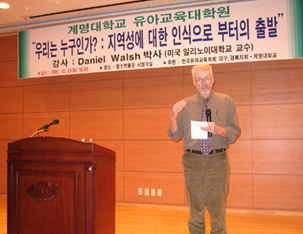 Editorial note: This lecture, organized and sponsored by the Keimyung Graduate School of Early Childhood Education and the Daegu & Gyeongbuk Division of Korean Society for Early Childhood Education, was given by Dr. Daniel J. Walsh (Curriculum & Instruction, University of Illinois at Urbana-Champaign) on Oct. 23 at Hengso Museum. The Gazette carries the lecture in three parts.
Editorial note: This lecture, organized and sponsored by the Keimyung Graduate School of Early Childhood Education and the Daegu & Gyeongbuk Division of Korean Society for Early Childhood Education, was given by Dr. Daniel J. Walsh (Curriculum & Instruction, University of Illinois at Urbana-Champaign) on Oct. 23 at Hengso Museum. The Gazette carries the lecture in three parts.The philosopher Richard Rorty (1989) once asked the eloquently simple question, “Who are we?” When he asked this question, he was referring to countries in Europe during the World War II. Some societies readily gave up their Jews to the occupying Germans. Others did not. They protected their Jews.
His question was particular, addressed to this historical reality. But it was also a more general question. It was a question about identity and culture. His point was simple. In some cultures when people said “we,” they included Jews. In others, they did not. My point here is that Rorty the philosopher asked a most profound question, but in simple language, in the language of Ana, the language of the simple things of daily life. The philosopher spoke in words that everyone could immediately understand—Who are we?
I am arguing that for teachers and researchers to be effective in what they do they must learn to share and to speak the language of the simple things, the language of the local. We have all been subjected to the hopelessly arcane and needlessly complex language that researchers like to use in their articles and books. Journals are often unreadable even to other researchers who are not in the specific area. The writing is designed not to communicate but to show off how smart the writer is. Too often the tortured writing is there to mask the fact that the writer doesn’t really have much to say.
To the extent that we continue to speak the language of the general, the complicated and inaccessible language of academia, we hinder knowledge production. To make matters worse, researchers try to get others to talk and write like them. So teachers end up speaking in jargon, in multisyllabic words. It should be the other way round. Researchers should learn to use their language, not to teach them to speak ours. Researchers’ language is not the language of the simple things of daily life in the classroom. That language is stilted and full of jargon. Howard Becker (1986) tells of his experience working with a student to simplify the writing in her dissertation. Finally, she complained in frustration, “Gee, Howie, when you say it this way, it looks like something anybody could say” (p. 7). Exactly.
Kenneth Kiewra (1994) offers what he calls the friend test for researchers. It goes like this. You should give your writing to friend outside your field and ask her to read it. If she cannot explain it to you the next day, you should go back and simplify it. It’s a good test.
I will end this discussion of language by returning to Ana. Ana, now retired, was a wonderful kindergarten teacher in Lisbon, Portugal. I met her once, and she mesmerized me with her direct honesty. We know of Ana, who worked quietly for decades in Lisbon because Teresa Vasconcelos, a graduate student who worked with me, did a year-long ethnographic study of Ana for her dissertation. Teresa’s study later became an influential and popular book in Portugal. Unfortunately, for us, it is available only in Portuguese.
Ana had a very local sense of who she was as a teacher. Her words were protesting Teresa’s interest in her. She worried that Teresa was making too much of her as a masterful teacher. What Ana, who was a masterful teacher, was really saying was this:
I don’t speak the language that you speak, the complex language of academe. I am not a researcher. This is my world. This is my work. This is my language. I do well with the simple things of daily life. Those things are my language. Do you understand? My language is the language of the simple things of daily life. That one I manage well. With that one I am perfectly at ease.
When researchers and teachers speak the language of the general, they distance themselves from both the people whom they should be talking to and whom they should be listening to. If we are ever going to really improve early schooling, we must learn to speak and understand Ana’s language, the language of particulars, of the simple things of daily classroom life. We must learn to help teachers to speak that language proudly. Being good researchers and good teachers requires speaking to two worlds, but we do not need two languages. Instead we need a single language, and that language is the language of the simple things of daily life, the language of the local, the particular.
 Finally
FinallyMy message is three-fold: First, teaching and research are different activities, but both begin with the particular. Let them inform each other. Second, both teaching and research are immersed in a particular culture. Third, Both teaching and research should share a common language, and this language should be an accessible, straightforward one—the language of the simple things of daily life.
I will end with a few cautions about what I am not saying. I am not saying researchers should not generalize. The goal of research is to generalize, but it should be done cautiously. I am not saying classroom teachers should become researchers. Classroom teachers already have a full-time job. Those of us who work at research universities have the time and resources to do both.
Both teaching and research require a rare combination of knowledge, skills, attitudes, and beliefs. Both are most challenging. Both take a long time to get good at. Both teaching and research require a commitment to stay close to the ground, close to the particular, close to the local. We are best when we stay close to the particular. I will end by again quoting William Blake.
He who would do good to another must do it in
minute particulars
General good is the plea of the scoundrel,
hypocrite, and flatterer
For art and science cannot exist but in minutely
organized particulars
(from Jerusalem, ch 3)
References
Rorty, Richard (1989). Contingency, Irony, and Solidarity. Cambridge: Cambridge University Press.
Becker, Howard S. (1986). Writing for social scientists: How to start and finish your thesis, book, article. Chicago: University of Chicago.
Kiewra, K. (1994). A slice of advice. Educational Researcher, 23(3), 31-33.








